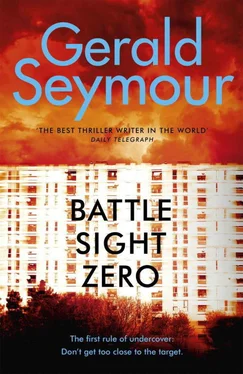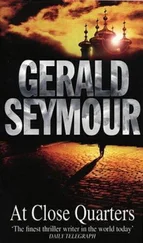And the phone kept ringing… No one said, not one of them, that they were sorry. The ropes were untied, his hands needed rubbing to restore circulation. He picked up his clothing, dressed without help, shaking, trembling, would take days to overcome the trauma… managed it. Lost it…
The same room of the same club. Wearing a wire, and not going to be searched, and the loot was being divided for different markets and the cash was being heaped in separate piles for the share-out. The heavy team had come in, bashing down doors, bringing firearms. No handcuffs for Norm Clarke but a warm congratulation. The last word had been from Bazzer, before they’d been led to the wagons.
‘I told you, you didn’t listen. My nose can see a cop.’
His sleep was broken, his dream over .
Not Phil Williams and not Norm Clarke, but Andy Knight – who might have made a mistake already and might not, but who would make a mistake, as clear as day follows night, and had twice evaded the penalty for a mistake. Reached for it while it pealed, lifted it and flicked the button.
‘Andy?’
‘Me, hi.’
‘You good?’
‘Better for hearing you – was dreaming, a horrible dream, won’t bore you. Thanks for waking me. Really brilliant to hear you. Missing you, Zed. Where are you?’
‘Oh, you know, just, just… Just that I wanted to hear your voice.’
A few words, nothing special, and the call ended. He understood loneliness, thought she was learning it – and thought about mistakes and where they’d lead. The first light of day came through the window, rose over the roofs and the chimneys.
‘Say it again… Don’t recollect the name.’
Andy Knight knew the sergeant, but the sergeant did not know him. He had come off a slow, stopping train running down the coast of the Exe estuary – the station served the Commando Training Centre. Pegs had rung him, suggested that he might do a half-day there on his way to the ferry, and that she’d fix the welcome party. There would not have been much trading in the deal: someone would brief him on the ‘weapon of choice’ but his cover name would apply and what he did and who he worked for was off limits. He had left his car farther down the line, a couple of stations back, so the registration would not be listed at the barracks.
‘I was here, but it’s not important.’
‘I believe you, but reluctantly. I was told you were one of us and needed a refresher. Don’t recall the name we’ve been given… also went on the website, looked up the name. Doesn’t tally.’
‘Life’s rich tapestry, moved on.’
‘Which tells me things I needn’t know. Right, let’s go to work.’
The sergeant, as Andy Knight remembered him, was rarely amused, but managed a dry grin, raised an eyebrow. Who he had with him would likely tease him most of the day. He thought little had changed. The same buildings, some newly painted and some looked tired, and the same mess-rooms and the same cramped parade ground where he had not been the best, nor the worst. He assumed that a mass of the new intake were away out on the moor or up on the common, on exercise or doing ball-crunching cross-country running or were out on ‘stealth and survival’. The place had a strange quiet to it.
A quiet and a familiarity, and Andy Knight felt a homecoming.
It was said of the Marine recruits who were shipped in here – raw eighteen- and nineteeen- and twenty-year-olds – that most came from car-crash backgrounds, and domestic circumstances described as ‘difficult’, and few had ever before been confronted with ‘standards’ to be reached. The barracks – some of it modern and some of it out of date – became a home for so many. Gave them a sense of family: the first time. He disliked thinking about his previous life, before becoming a Level One, reckoned it an indulgence that endangered him, tried to erase memories, attitudes, from his thoughts. Reflected briefly that his own childhood had not been a motor vehicle accident, that he had been brought up in a distant and dignified and gently loving atmosphere, and they had all been at the front gate of a semi-detached property to wave him off when the taxi had driven him away to the station. What was true was the feeling of belonging, had come at Lympstone. This same sergeant had lectured them, first day or second: ‘It’s more than just a green beret, it’s a state of mind’, and: ‘First to understand, first to adapt and respond, and first to overcome’. They had taught him those aims, drummed into him the need to be inquisitive and adventurous, and that being ‘close to, near to, success, is inadequate’. He had loved it, might have been made for him. When he had left, he had gone into one of the Commandos, had been thought well of, had been a standout for the speciality tasking of a marksman, a sniper, and was thinking with only minimal apprehension of a deployment in the dog-days of the Afghan commitment.
The sergeant walking briskly beside him might not now have the fitness required for the 30-mile trek. Might not be able to stand at the bar in his Mess all night, and down them and walk in a straight line back to his billet, but was the man – Andy would have said – that you would most want watching your back when on patrol in the maize fields of Helmand, or where he was going. A man who would protect you, no fuss and no drama, in any darkened alley, round any bad corner. No one would be at his back in the alleyway with no lighting, and no one would be watching for him round every bad corner. Somewhere, far down the road and sitting on a radio would be some protection but unlikely to be able to preserve his life if he cracked the mould, made the mistake. They came to a doorway, paused at it. There was an old catchphrase that the Marines’ sergeants used to trot out to the kids with ‘crusader’ tendencies, looking to make a name for themselves in a fire-fight: ‘heroes make poor leaders’. He was no hero, neither had Norm Clarke been, and the title did not apply to Phil Williams, nor could he have said that what he had done, where he had been, had changed the situation of the world around him, nor what he would do where he was going. He’d walked reasonably well but the sergeant – gimlet-eyed in the old days and probably still blessed – would have noted the disability, seen the almost, not quite, hidden limp.
‘Where I’m to drop you off.’
‘Thanks.
‘They’ll ring me when they’re ready to chuck you out.’
‘One thing, can I ask one thing?’
‘Ask, I’ll try.’
Andy did, said what he wanted before leaving them. Funny old thing to ask for. Nobody now watched his back but then he had left the family.
Zeinab stepped off the train, trailed her bag. She walked at a good pace down the length of the platform, across the concourse, had seen the signs for the escalators to the Underground. The boys, all of whom had known Dewsbury, would have walked those steps… She had been ten at school and the day barely started, then older kids talking, hushed, fearfully, of explosions in London. Later, at home, her parents had watched the big television, and the boys had been referred to as ‘idiots, lunatics, fools’ but she had thought that was for her to hear and did not know what had passed for real inside their minds… Did they pause at the top of the steps? Did they hug, kiss, shrug under the weight of the rucksacks, mouth a prayer? Or did they just keep walking towards the Underground? It was likely that they had walked past her home, on the same pavement with the cracks and the weeds at her front gate, on their way to the Merkazi… Teenagers, five years younger than she was now, who had gone to Syria and had no known graves… and they had been her cousins. They were owed her loyalty, and her stomach ached from hunger, and she glanced at her watch, and reckoned she had the time, and went to a fast-food counter.
Читать дальше












